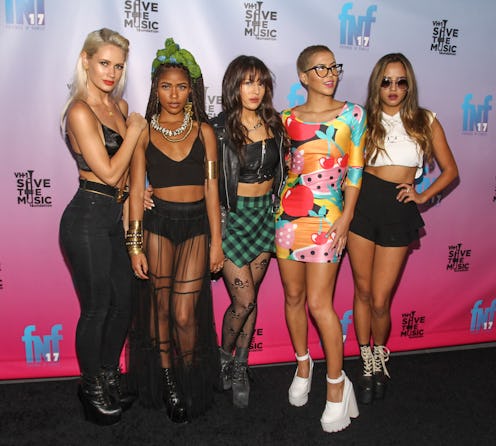Entertainment
Is It Time to Ditch the Term 'Girl Group'?
Robin Antin, the excessively nipped-and-tucked mastermind behind The Pussycat Dolls, has just unleashed the next great pop super-group upon the world. Its name? G.R.L. A five-woman group consisting of members Simone Battle, Lauren Bennett (of LMFAO’s “Party Rock Anthem” fame), Emmalyn Estrada, Natasha Slayton, and Paula Van Oppen, G.R.L. had their first major live performance at South by Southwest (SXSW) in Austin, Texas last week — and they absolutely killed it. They're also featured on rent-a-rapper Pitbull’s latest song, “Wild Wild Love,” which recently made its chart debut, and their own official lead single, “Ugly Heart,” just premiered online last week. Whew.
It certainly seems like the women of G.R.L. are taking all the right steps to become the first major “girl group” in the United States since, well, The Pussycat Dolls. But their impending takeover comes with a question: In 2014, is the term “girl group” offensive? Does it need to be retired and replaced with a new term, one that’s not potentially demeaning to women? Let’s talk about it.
To start, the term “girl group” just feels wrong. After all, despite the group's misleading name, the members of G.R.L. are all adult women — not girls, a word that more accurately describes children. Beyoncé did famously attempt to empower women through use of the word "girls" in 2011 with her single, "Run The World (Girls)," but the track's disappointing chart performance implies that a lot of women didn't end up feeling all that empowered. And while you’re thinking about it, yes, we do still use the term “boy band” to describe acts like One Direction, but generally speaking, the word “boy” isn’t used to describe adult men in the United States (though it can carry a negative, racist connotation). As Forbes writer Kashmir Hill says in her recent article, "Girls? Ladies? Folks? Here’s a Visual Guide to What You Should Call That Group of Individuals," “It’s hard to imagine Robert Downey Jr. signing up to play ‘Iron Boy.’”
Okay, I’m going to go ahead and do something that we were probably all taught not to do in English class — give some dictionary definitions. (But I promise, there’s a purpose.) Merriam-Webster’s website provides a few different definitions for the word “girl”:
1 a: a female child from birth to adulthood
b: DAUGHTER
c: a young unmarried woman
d sometimes offensive: a single or married woman of any age
2 a: SWEETHEART
b sometimes offensive: a female servant or employee
So, there you have it. The word “girl” can clearly have an offensive, demeaning and/or condescending connotation. I wanted to look to a dictionary to illustrate the pervasiveness of the problem.
But so much more important than dictionary definitions are the experiences of women who have felt diminished or even bullied by the word “girl” in their lives. Psychologists have argued that calling women “girls” is a form of “subtle sexism” that permeates our "daily interactions." Feminist writer Bonnie Greer said of the use of the word “girl” in 2004:
A girl is someone who is not an adult, not a grown-up, is not someone who takes responsibility for herself, she’s a wimp, a loser, a cutie. When you get past a certain age, as a mature adult, you want to be treated as an adult. . . . In a culture where women are underpaid, are striving to make inroads, we should pay attention to how we address one another.
Further, in a fascinating piece on the growing acceptance of the word “lady” in modern feminism recently published in the New Republic, writer Ann Friedman calls the word “girl” “infantilizing.” So, why are we still using the term “girl group”? Is it because we don't really have a widely used, casual word for women like "guys"? (No, "gals" doesn't count.)
“Girl group” was originally used to describe the now iconic groups of the '50s and '60s — groups that sometimes had adolescent members (The Marvelettes, The Supremes), primarily sang about love, and projected an image of innocence and naivety (often through the guidance of male managers and professional male songwriters). When you look at it that way, the term refers to a very specific kind of musical act that only existed for a brief period of time. It doesn’t really apply to more recently popular groups like The Spice Girls, Destiny’s Child, and TLC — groups that sang about more adult topics and, to a certain extent, had more autonomy and creative control.
Throughout the years, groups of women have made music that has introduced us to totally new sounds, challenged gender roles, and given voice to the female perspective on a variety of important issues — this is not the work of “girls,” but rather, powerful, intelligent, and mature adult women. So, what term do we use instead? How about just “group” or “band”? Why do we feel the need to highlight the gender makeup of our musical groups at all? We don't say "girl musician" when talking about Taylor Swift, or "boy musician" when talking about Justin Timberlake.
Put simply, language matters. Maybe it’s time we stop using the term “girl group” to describe modern musical acts. After all, executing perfectly in-sync hairography while singing live (something that the members of G.R.L. do quite well) AND giving women a voice in the male-dominated world of pop music? Well, that's not exactly child's play.
Check out G.R.L.’s SXSW performances via iTunes. The women of G.R.L. have been working hard in the studio with pop producers Dr. Luke, Max Martin, Cirkut, and Darkchild on their debut album, which is due out sometime this year through Kemosabe Records.
